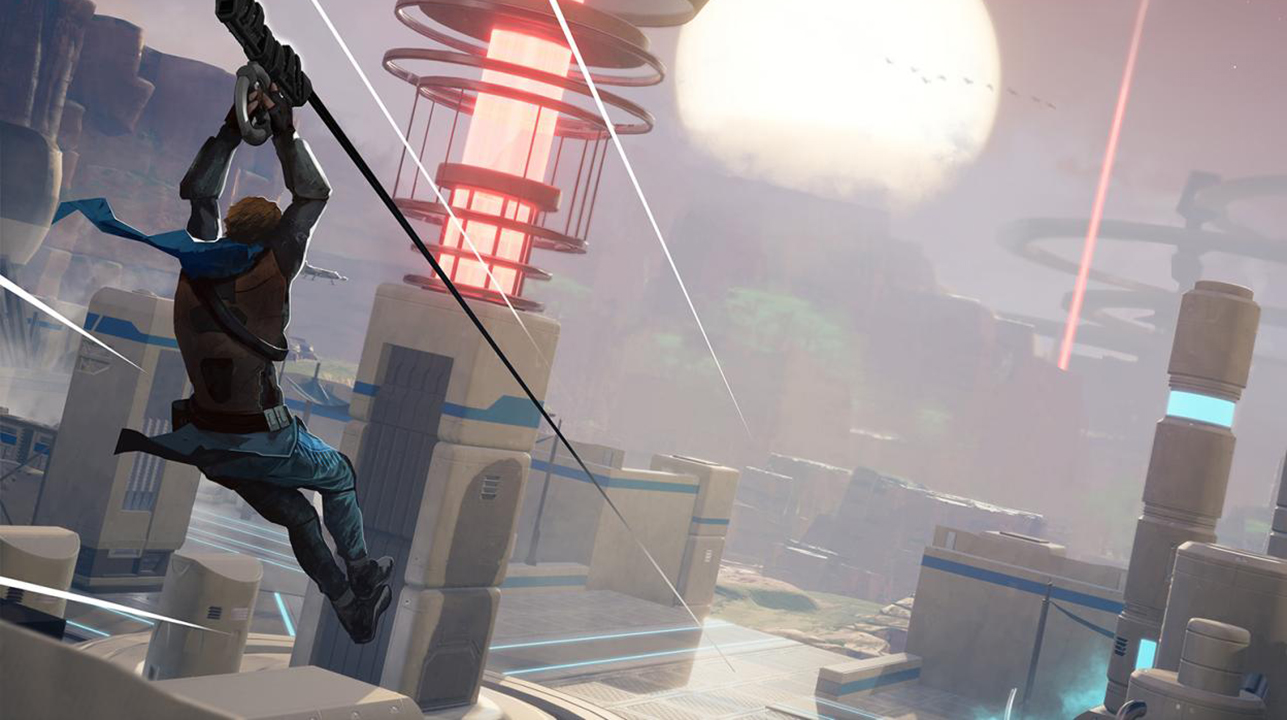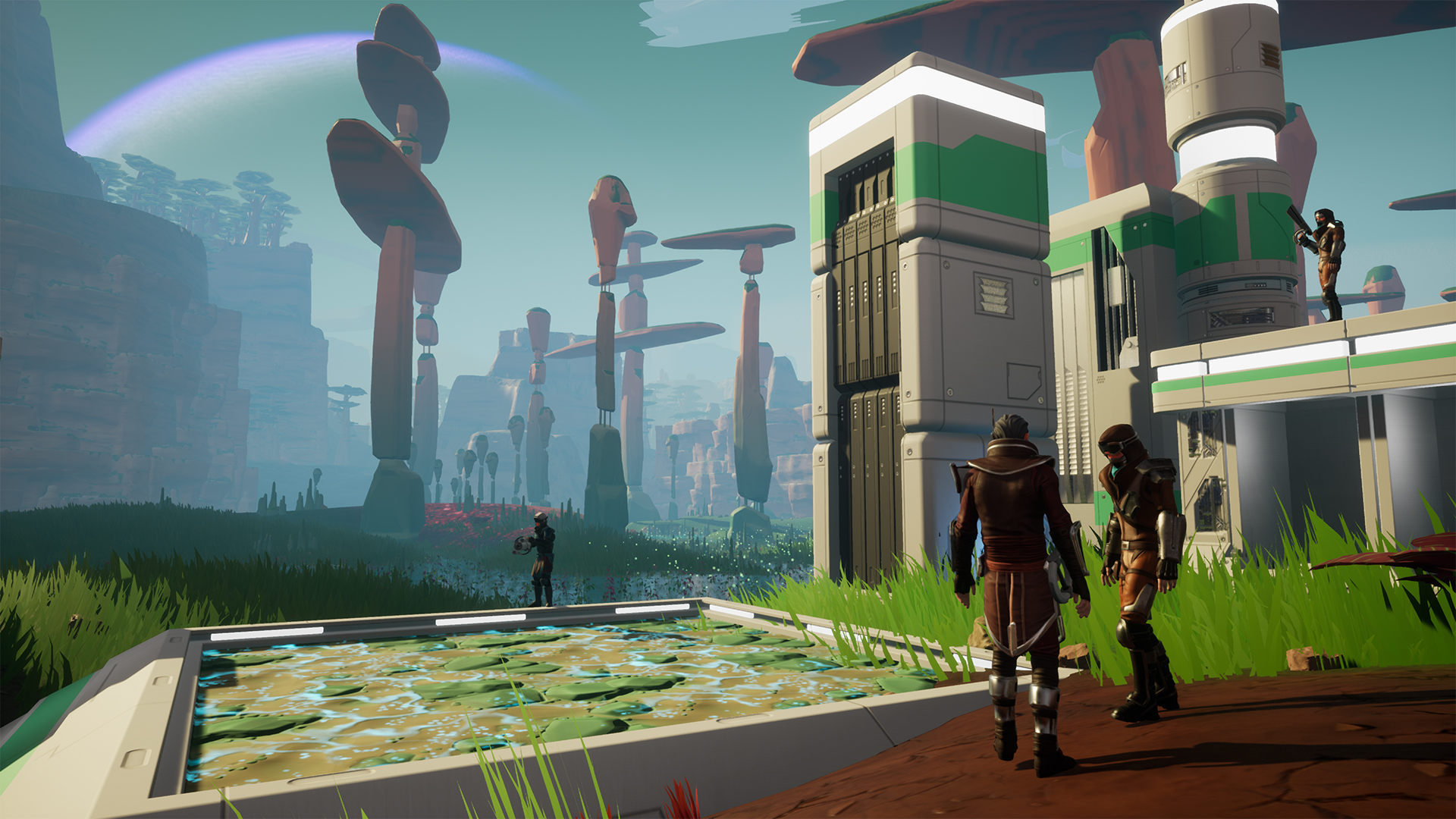'Project C' is a super ambitious online RPG by ex-Ubisoft, Rockstar, and CD Projekt Red developers
Project C aims to be a complex, player-driven virtual world where you can do anything.

Massively multiplayer online games feel like they're on the verge of a renaissance. Most of the genre's original luminaries—from Raph Koster to Brad McQuaid—have returned to make new MMOs that push the genre forward, but they're far from the only ones. Enter Darewise Entertainment, a team made up of almost 30 developers with resumes that include Red Dead Redemption 2, Assassin's Creed, The Witcher 3, Horizon: Zero Dawn, and Dishonored, who have joined forces to create an ambitious-as-hell virtual world where players self-organize their own societies while colonizing an alien planet.
Code-named Project C, this sandbox online game is so early in development that it's practically a videogame fetus—a tiny pre-alpha that players can only access after filling out a comprehensive survey and being interviewed by one of the developers at Darewise to ensure players understood the project's current development and scope. But, as CEO Benjamin Charbit and lead designer Brad Langsford tell me, Project C wants to be the next evolution of online games: A persistent virtual world for players to explore, build settlements and businesses, and even convert their in-game riches back to real-world money.
A whole new world
Charbit tells me that Project C is built from a single desire: Nostalgia for a time when MMOs were the social network. "For all those people who were playing Everquest, Ultima Online—these were real social networks where you had very sophisticated relationships," Charbit says. "It's funny because everybody is like, 'oh, look at the power of social networks and social media,' and we're like, what are you talking about? I experienced that when I was playing Mankind when I was 16, then on IRC when I was playing Counter-Strike and again in 2004 when I was playing World of Warcraft."

I'm told everything about Project C is meant to foster the same kind of deep relationships, a web of interconnected social systems tied together by third-person action and exploration. Players take on the role of settlers colonizing an alien world, using resources to build settlements, player-run organizations, and more. At the heart of Project C are its contracts, a quest system where players can create tasks and rewards for other players to fulfill.
"It's a game of activities and no activity is no more important than another," Charbit says. "So if you like exploring, that's great, because you can do that and at some point what you're building through that exploration—in terms of equipment and skills—you can turn into a service. So you can start servicing another player who doesn't give a shit about exploration, like me. I like to trade. But if you go out there and you find items, artifacts, resources, you can give them to me and I'll buy them from you and start to sell them. And I'll create contracts for players like you, and if you fulfill those contracts you'll get rewards."
We want to remove all the constraints. You only do what you are into, what you are able to, what you have time for.
Benjamin Charbit
Project C won't force you into a specialization the way that, say, EVE Online's skill system does—where progress comes at the expense of time-intensive passive training. Instead, most progression is gear based, with different player professions relying on different tools to get the job done. An explorer, for example, might have ziplines while a mechanic will rely on gadgets to build machine parts. All of these items will be crafted by other players and the better the quality, the more effective the item will be, in turn empowering the player who wields it. "We want to remove all the constraints," Charbit says. "You only do what you are into, what you are able to, what you have time for. I have two kids and I run a company, I love playing World of Warcraft, but it will never happen for me again."
One unique feature is that, like Second Life, players will be able to freely buy and sell currency for real money—for a small fee, of course. Being free-to-play, Project C won't have a plethora of premium currencies, just a single, tradeable currency that players can either earn in-game or buy directly. Likewise, if you make a fortune in the game, you can cash out for real money. It's a fascinating idea that few MMOs ever explore, aside from Entropia Universe where virtual space stations and entire planets have sold for upwards of $300,000.
The biggest gaming news, reviews and hardware deals
Keep up to date with the most important stories and the best deals, as picked by the PC Gamer team.
Big ambitions
For each of Project C's big ideas, though, I have a lot of bigger questions that can't be answered because, right now, Project C is still so early in its infancy. There's a lot of talk of what Project C will become, when right now it's largely just a third-person action game with basic crafting and gathering. When it comes to making a thriving online ecosystem, the devil is in the details and Project C's community-driven development means the team needs to stay flexible and avoid a rigid roadmap.
Most of these ideas aren't executed in the current 0.4.0 version that's available to a small number of testers. That number is expected to increase soon, because Darewise wants to build Project C with its community, taking feedback at every stage to tailor the game around players' wants and desires. "We put the game in the hands of players way earlier than most developers would dare to do," lead designer Brad Langsford tells me. "I feel like a lot of games are doing that now, but we're making it a priority. And we're building the game around it. The focus on the community and the interactions of the community."
Things are progressing rapidly, though. For example, right now Project C's map is a hand-crafted zone roughly about one square kilometer in size. By December, Charbit is hoping to increase the size to nine square kilometers and soon after a whopping 64 square kilometers. To handle that exponential increase in scale, the team built a custom procedural terrain system that generates landscapes that the team then uses as a foundation to create more hand-crafted geography.
It sounds interesting, but this isn't the first time a developer has promised the long-awaited MMO revolution. And most of those games are now dead or didn't deliver. There's no guarantee that Project C won't be another overly ambitious online game that falls apart in a few years—an especially risky proposition considering the only way to guarantee access to later stages of development is to buy a founder's package that costs a whopping $150 (Charbit says this is only for the most hardcore fans wanting to support the game).
Still, the team's collective resume of big-budget games like Red Dead Redemption and Assassin's Creed is exciting. A lot of the most promising online games today are being made by the genre's original visionaries or relative outsiders, as is the case with Dual Universe. I'm intrigued to see what the developers of some of the world's most popular games can bring to the table that's different.
Update, 3:25pm PT: This article originally stated Project C's founder's pack cost $190 but that was in Canadian dollars so we've changed the price to reflect that and clarified that it does not grant access to the pre-alpha and is meant to be purchased by only the most dedicated fans.
With over 7 years of experience with in-depth feature reporting, Steven's mission is to chronicle the fascinating ways that games intersect our lives. Whether it's colossal in-game wars in an MMO, or long-haul truckers who turn to games to protect them from the loneliness of the open road, Steven tries to unearth PC gaming's greatest untold stories. His love of PC gaming started extremely early. Without money to spend, he spent an entire day watching the progress bar on a 25mb download of the Heroes of Might and Magic 2 demo that he then played for at least a hundred hours. It was a good demo.


